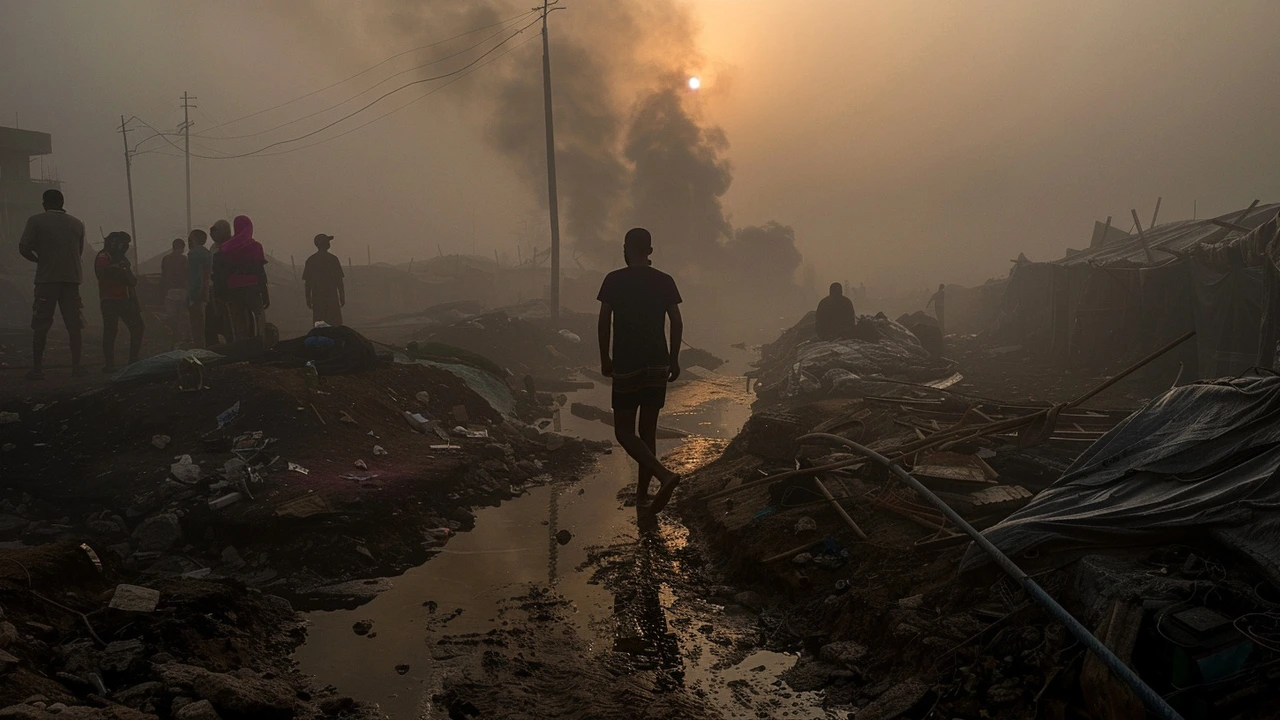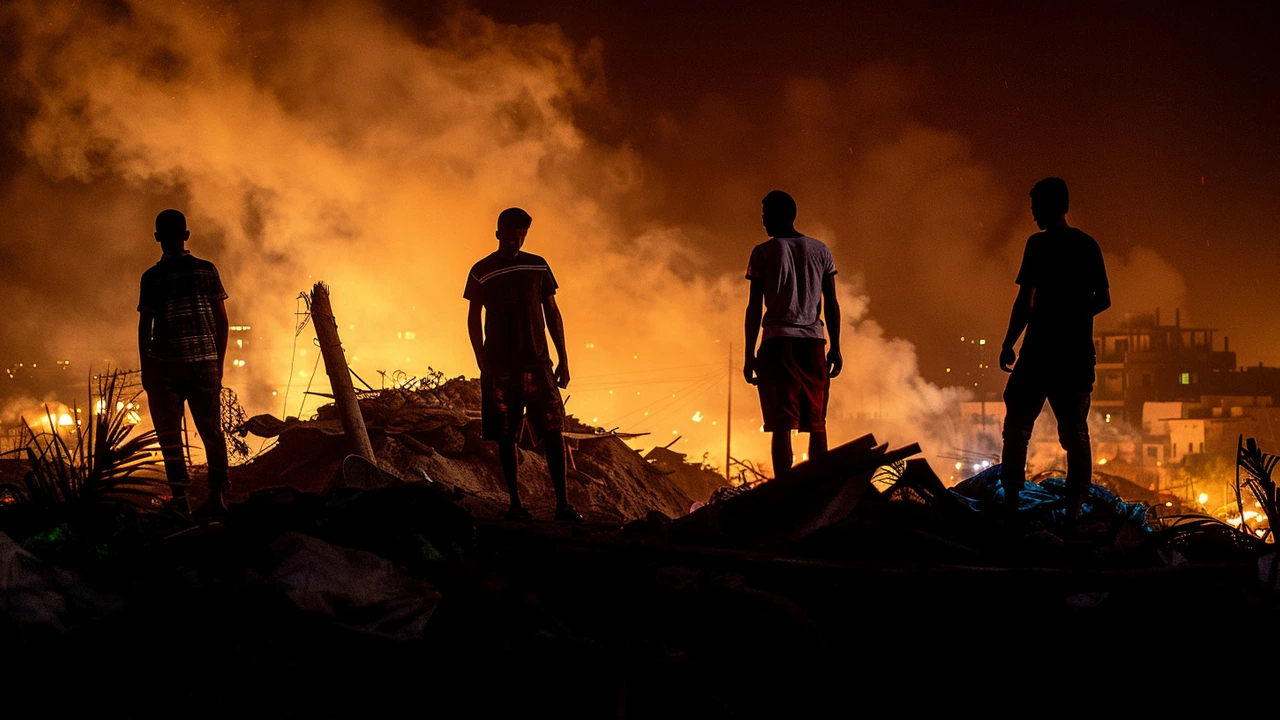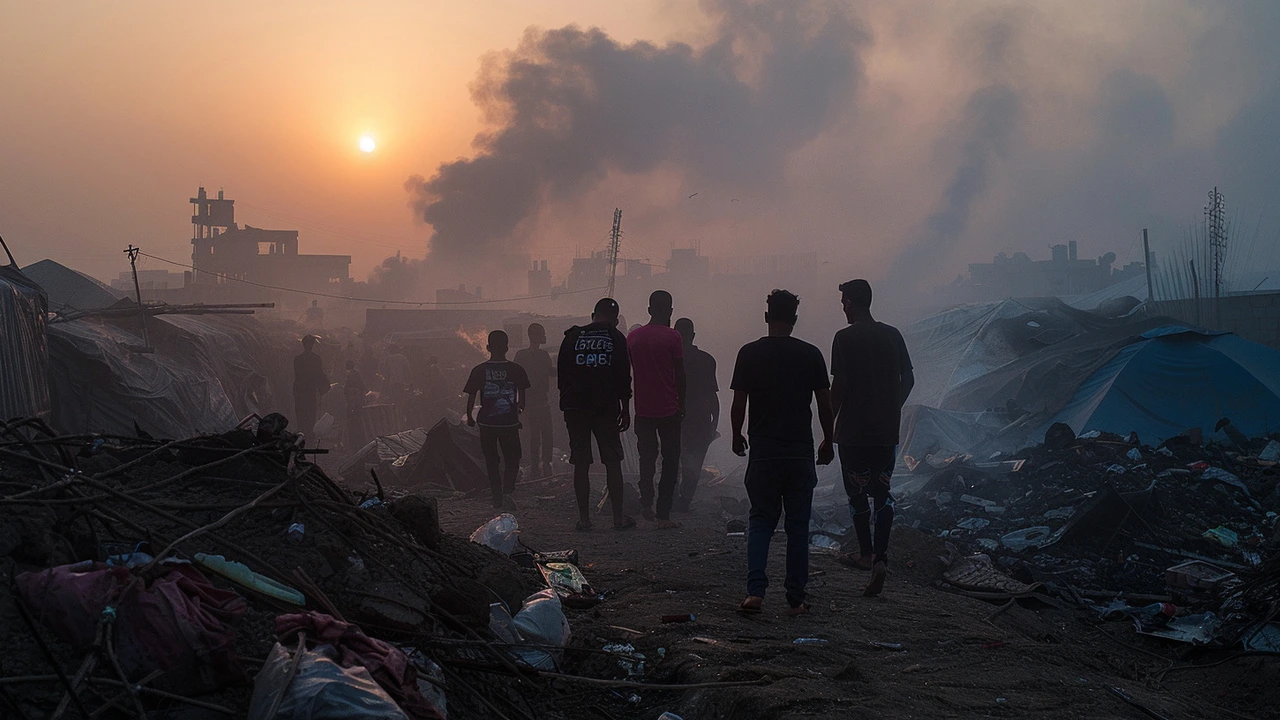Global Reaction to Rafah Strike
Israel finds itself at the center of a storm of international condemnation following a devastating strike in Rafah, Gaza, that resulted in the deaths of 45 individuals and the setting ablaze of a tent city housing displaced Palestinians. This event has brought forth a chorus of outrage from Arab nations, global organizations, and the United Nations. Seen as a 'tragic accident' by Israel, the attack has nonetheless been described by the UN Secretary General as a 'horror that must stop.'
Details of the Incident
The incident unfolded on a Sunday evening, targeting two senior Hamas operatives. However, the repercussions of the strike extended far beyond its intended targets as it triggered a fire that engulfed a displacement center. The resulting blaze claimed the lives of many innocents who had already been uprooted from their homes, compounding an already dire humanitarian crisis. This tragic turn of events has cast a spotlight on the heavy toll of military actions in densely populated civilian areas.

Immediate Aftermath and Investigations
Following the incident, the Israeli military announced the launch of an investigation to uncover the details that led to such a tragic outcome. In the meantime, reactions from the international community have been swift and severe. Global leaders and organizations have called for immediate measures to prevent further civilian casualties, emphasizing the need for stringent precautions in military operations to protect innocent lives.
Regional Repercussions
The strike has had far-reaching consequences beyond the immediate tragedy. Tensions in the region have escalated, especially with a reported shooting incident in the border area between Egypt and the southern Gaza Strip, which led to the death of an Egyptian guard. This development has added another layer of complexity to the already volatile situation, marking a dangerous escalation in regional hostilities.
Broader Reactions and Condemnations
The fury unleashed by this incident isn’t confined to immediate neighbors. Countries such as Egypt, Qatar, Jordan, Saudi Arabia, and Turkey have vehemently condemned the strike. Accusations of 'war crimes' and 'dangerous violations of international law' have dominated the discourse, underscoring the gravity with which this incident is being viewed on the global stage. The international community is pressing for accountability and a reevaluation of military strategies to avoid future tragedies.

Calls for Peace and Accountability
In the wake of the Rafah strike, there is a growing chorus demanding an end to the violence. The UN Security Council has announced plans for an emergency session to deliberate over the attack, reflecting the urgency of the situation. Calls for Israel to implement greater safeguards to protect civilians have been amplified, with many advocating for a diplomatic resolution to the ongoing conflict. The strain on international relations highlights the necessity for concerted efforts to de-escalate tensions and foster a path toward lasting peace.
The Human Cost
The human toll of such conflicts continues to mount. Displacement, destruction, and loss of life have become painful constants in regions plagued by ongoing hostilities. Human rights organizations are stressing the importance of adhering to international law and humanitarian principles, urging all parties to prioritize the protection of civilian lives above all. The Rafah strike serves as a stark reminder of the cost of conflict and the imperative need for peaceful resolution.
The Path Forward
As the world grapples with the aftermath of this incident, the focus remains on seeking justice and ensuring such tragedies do not recur. International diplomacy, coupled with stringent adherence to humanitarian laws, appears to be the pathway forward. The situation in Rafah has underscored the urgent need for global unity in addressing the root causes of conflict and striving for a future where peace and safety prevail for all.
Conclusion
In conclusion, the Rafah strike has once again highlighted the fragile nature of peace in conflict zones and the devastating impact on civilian populations. While investigations proceed, the international community's call for accountability and peace rings louder, advocating for a shift towards diplomatic engagement and protective measures for innocents caught in the crossfire. The path to resolving such deep-seated conflicts is fraught with challenges, yet the hope remains for a more peaceful and just world.


James Lawyer
The recent Rafah strike undeniably highlights the critical importance of stringent operational protocols and transparent investigations. While Israel labels the event a tragic accident, international law mandates accountability for civilian casualties. A thorough, impartial inquiry can help clarify the sequence of events and restore some measure of trust among the global community. Moreover, engaging neutral observers may aid in delivering a credible assessment. Sustained diplomatic dialogue remains essential to de‑escalate tensions and prevent further loss of innocent life.
Abby Culbertson
i cant even believe how many people died in that tent city. its so sad and i dont get why this keeps happening.
Awolumate Muhammed Abayomi
Guys, we must stand united and push for a peaceful solution. This tragedy shows how urgent it is to bring all parties to the table. If we all keep shouting for justice, maybe we can stop another disaster. Lets keep the conversation moving and remind leaders that civilians deserve protection. Trust me, together we can make a difference.
Josh Tate
I feel the weight of every family that lost a loved one in Rafah. It’s heartbreaking to read about a tent city turning into a death trap. While investigations are crucial, we can’t wait for bureaucratic delays to halt the suffering. People on the ground need immediate humanitarian aid, safe corridors, and a clear guarantee that such attacks won’t happen again. My thoughts are with the survivors, and I hope the global community steps up.
John Smith
It's a mess.
Alex Soete
Absolutely, we need to channel this outrage into constructive action! The Rafah incident is a stark reminder that any military operation must prioritize civilian safety above all else. Let’s amplify calls for an independent probe while also supporting NGOs delivering relief on the ground. By staying engaged and sharing verified information, we can pressure policymakers to adopt stricter safeguards. Keep the momentum going, friends-peace is possible if we all stay vigilant and compassionate.
Cara McKinzie
So another day, another headline about bloodshed and broken promises. The drama never ends, but the critique stays the same: leaders talk, but actions lag. It's exhausting to watch the cycle repeat, yet the world watches from a safe distance. Maybe if someone actually cared, we'd see real change. Until then, we get the same tired script of condemnations and empty meetings.
Mohit Singh
Honestly, we’re fed up with the endless excuses. It's infuriating that the same pattern repeats-military might over civilian lives-while the rhetoric stays soft. If you’re not outraged, you’re complicit. The world must stop pretending neutrality is an option when atrocities unfold. Speak up, act now, or keep being part of the problem.
Joseph Conlon
Let me start by saying that the Rafah strike, while undeniably tragic, also serves as a catalyst for a broader discussion about military ethics and the evolving nature of modern conflict, particularly in densely populated urban settings where the line between combatant and civilian is often blurred beyond recognition; this is not merely a regional issue but a global one, with implications that ripple through diplomatic corridors and humanitarian corridors alike. First, we must acknowledge that every conflict carries inherent risks, yet the responsibility borne by those wielding advanced weaponry is disproportionately heavier, demanding a level of precaution that seemingly was not met in this instance. Second, the investigative frameworks currently in place appear inadequate, lacking the transparency and independence necessary to restore any semblance of trust among the international community and the affected populations. Third, the subsequent regional escalation, exemplified by the shooting near the Egypt‑Gaza border, underscores a dangerous feedback loop where one incident begets another, spiraling into an ever‑widening circle of violence. Fourth, while some may argue that targeting senior operatives justifies collateral damage, international humanitarian law is unequivocal about the principle of proportionality, a principle that, in hindsight, seems to have been grossly violated. Fifth, the global outcry-ranging from statements by the United Nations to condemnations by neighboring states-reflects a collective yearning for accountability, a yearning that must translate into actionable reforms. Sixth, the humanitarian fallout cannot be overstated; families displaced multiple times now face a relentless ordeal that erodes their resilience and hope. Seventh, beyond immediate relief, there is an urgent need for long‑term strategies that address the root causes of displacement, be they political, economic, or social. Eighth, the media coverage, while extensive, often fails to capture the nuanced perspectives of those on the ground, reducing complex human experiences to mere statistics. Ninth, this event should serve as a stark reminder for all parties involved that the price of ignoring civilian safety is immeasurably high, both ethically and geopolitically. Tenth, moving forward, a multi‑layered approach that includes robust international monitoring, stricter engagement rules, and genuine diplomatic outreach is essential. Eleventh, any lasting peace will depend on the willingness of all actors to prioritize human life over strategic objectives, a willingness that, thus far, remains questionable. Twelfth, without decisive action, the pattern of tragedy will persist, eroding any remaining faith in the mechanisms designed to prevent such outcomes. Thirteenth, let us not forget that behind each statistic lies a story, a family, a future snatched away. Fourteenth, the onus is on the global community to transform outrage into concrete policy shifts that safeguard civilians. Finally, while this commentary may appear exhaustive, the gravity of the situation demands nothing less than a comprehensive, relentless pursuit of justice and peace, lest we find ourselves repeating history’s darkest chapters.